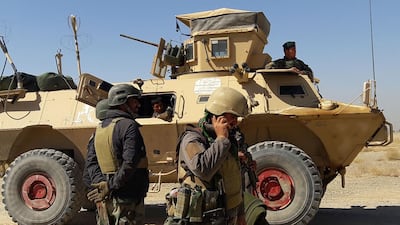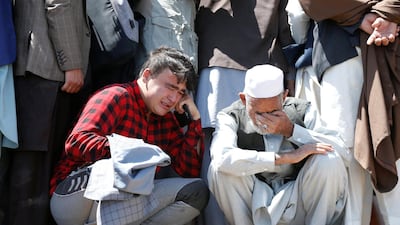Afghanistan's Taliban insurgents declared a three-day nationwide ceasefire for the Eid Al Fitr holiday on Monday as the country mourned the deaths of more than 50 people, mostly students, in a bombing outside a school in the capital.
Just hours after the ceasefire was announced, 11 people died when a bus in southern Zabul province struck a roadside mine, the interior ministry said.
At least 24 more people on the bus were injured, ministry spokesman Tariq Arian said. Improvised explosive devices litter the countryside and have been used extensively by the Taliban.
The ceasefire announcement comes as the United States continues to pull out its last 2,500 troops from the violence-wracked country despite faltering efforts between the Taliban and Afghan government to end a decades-long war.
A Taliban statement instructed its fighters to "halt all offensive operations against the enemy countrywide from the first till the third day of Eid" but to stand ready to respond "if the enemy conducts any assault or attack against you during these days".
Taliban spokesman Suhail Shaheen said the ceasefire was declared “to provide a peaceful and secure atmosphere to our compatriots . . . so that they may celebrate this joyous occasion with a greater peace of mind.”
The start of Eid Al Fitr, expected either on Wednesday or Thursday, depends on the sighting of the new moon that marks the end of the Muslim fasting month of Ramadan. The Taliban declared similar ceasefires last year to mark Islamic holidays.
The government usually reciprocates with a truce. "We welcome the announcement ... the Islamic republic is also ready and will announce soon," said Fraidon Khawzon, spokesman for chief negotiator Abdullah Abdullah.
The government blamed the Taliban for Saturday's attack outside a girls' school in Dasht-e-Barchi, a suburb of the capital largely populated by the Shiite Hazara community, which is often targeted by extremist Sunni militants.
A series of blasts outside the school killed more than 50 people and wounded more than 100.
It was the deadliest attack in more than a year.
The Taliban, who denied responsibility, had earlier issued a statement saying the nation needed to "safeguard and look after educational centres and institutions".
On Sunday, relatives buried the dead at a hilltop site known as Martyrs Cemetery, where victims of attacks against the Hazara community are laid to rest.
Hazaras are Shiite Muslims and considered heretics by extremist Sunnis. Sunni Muslims make up the majority of the Afghan population.
Bodies in wooden coffins were lowered into graves one by one by mourners still in a state of shock and fear.
"I rushed to the scene [after the blasts] and found myself in the middle of bodies, their hands and heads cut off and bones smashed," said Mohammad Taqi, a resident of Dasht-e-Barchi, whose two daughters were students at the school but escaped the attack.
"All of them were girls. Their bodies piled on top of each other," he told AFP.
Books and school bags belonging to the victims still lay scattered at the site of the attack a day after the blast.
Afghan President Ashraf Ghani has declared Tuesday a day of national mourning for the victims.
"This savage group does not have the power to confront security forces on the battlefield, and instead targets with brutality and barbarism public facilities and the girls' school," he said.
The attack drew widespread global condemnation. Pope Francis called it "an inhumane action", while Iran blamed the extremist group ISIS, which has a presence in Afghanistan.
India, meanwhile, called for the dismantling of "terrorist sanctuaries" and a ceasefire to boost peace efforts.
The Taliban insist they have not carried out attacks in Kabul since February last year, when they signed a deal with Washington that paved the way for peace talks and withdrawal of the remaining US troops.
The Taliban have clashed daily with Afghan forces in the rugged countryside even as the US military reduces its presence.
The United States was supposed to have pulled all forces out by May 1 as agreed with the Taliban last year, but Washington pushed back the date to September 11, a move that angered the insurgents.
In a message released on Sunday, Taliban leader Hibatullah Akhundzada insisted that any delay in withdrawing the troops was a "violation" of the deal.
"If America again fails to live up to its commitments, then the world must bear witness and hold America accountable for all the consequences," he said.







